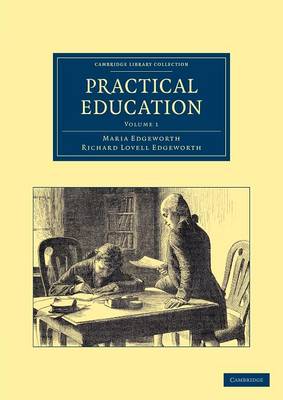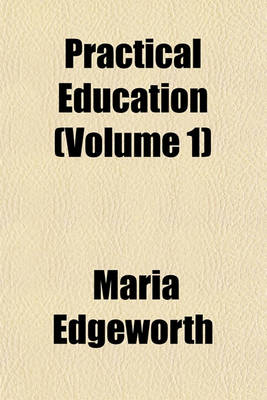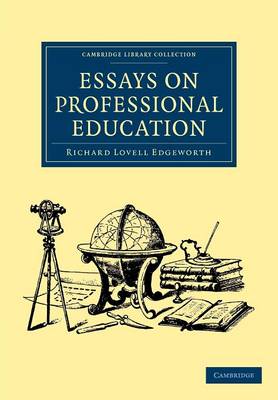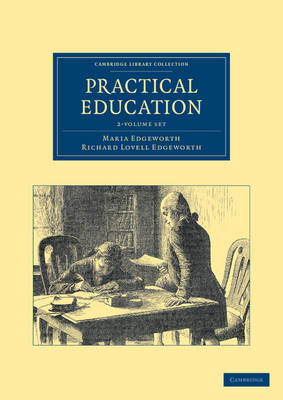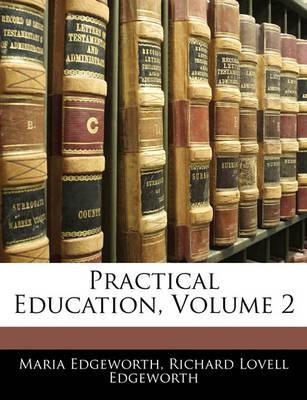Cambridge Library Collection - Education
1 primary work • 6 total works
Volume 1
The scientist Richard Lovell Edgeworth (1744–1817), educated at Trinity College, Dublin, and Oxford, was a Member of the Lunar Society of Birmingham, where he exchanged ideas with other scientists, including James Watt, and was known for his significant mechanical inventions. However, Edgeworth's real interest was education: in this 1788 two-volume work, written with his daughter, the poet Maria Edgeworth (1768–1849), he draws on his own experience of raising twenty children (by his four wives), from which the work derives its authority and innovative character. The work was very influential, and led to his Essays on Professional Education (1809; also reissued in this series). The two volumes discuss the theories of philosophers and educationalists, while in general arguing for the importance and formative character of early childhood experiences. Volume 1 deals with different areas of childhood education, including play, learning, and obedience and good behaviour.
The scientist Richard Lovell Edgeworth (1744-1817), educated at Trinity College, Dublin, and Oxford, was a Member of the Lunar Society of Birmingham, where he exchanged ideas with other scientists, including James Watt, and was known for his significant mechanical inventions. However, Edgeworth's real interest was education: in this 1788 two-volume work, written with his daughter, the poet Maria Edgeworth (1768-1849), he draws on his own experience of raising twenty children (by his four wives), from which the work derives its authority and innovative character. The work was very influential, and led to his Essays on Professional Education (1809; also reissued in this series). The two volumes discuss the theories of philosophers and educationalists, while in general arguing for the importance and formative character of early childhood experiences. Volume 1 deals with different areas of childhood education, including play, learning, and obedience and good behaviour.
One of the foremost authors of the late eighteenth and early nineteenth centuries, Maria Edgeworth (1768-1849) made the project of women's education the pillar of her career. Letters for Literary Ladies (1795), her first published work, takes up this question in earnest, offering a staunch defence of women's intellectual training and an impassioned warning against its neglect. The first two letters likely draw from an exchange between Richard Edgeworth, Maria's father, and his friend Thomas Day, presenting arguments for and against educating young women in the sciences and philosophy. The 'Letters of Julia and Caroline' illustrate this debate in epistolary form, dramatising both sides of the argument. The final 'Essay on the Noble Science of Self-Justification' serves as a wry critique of women's own self-deceptions. Complex and provocative, Letters for Literary Ladies demonstrates Edgeworth's early exploration of the subject that would define her career.
The scientist Richard Lovell Edgeworth (1744-1817), educated at Trinity College, Dublin, and Oxford, was known for his significant mechanical inventions. He was a Member of the Lunar Society of Birmingham, where he exchanged ideas with other scientists, including James Watt. However, Edgeworth was also greatly interested in education: drawing on his own experiences of raising twenty children (by his four wives), in 1788 he published, with his daughter, the poet Maria Edgeworth, his famous two-volume Practical Education (also reissued in this series). The work was very influential, and led to this book, published in 1809, a series of essays on professional education (again written in co-operation with Maria), dealing with the nature of different occupations in a state. He discusses education for the professions, including the Church, the Army and the Law, but also refers to the education of statesmen, gentlemen and even princes.
Practical Education 2 Volume Set
by Maria Edgeworth and Richard Lovell Edgeworth
Published 24 May 2012
The scientist Richard Lovell Edgeworth (1744-1817), educated at Trinity College, Dublin, and Oxford, was a Member of the Lunar Society of Birmingham, where he exchanged ideas with other scientists, including James Watt, and was known for his significant mechanical inventions. However, Edgeworth's real interest was education: in this 1788 two-volume work, written with his daughter, the poet Maria Edgeworth (1768-1849), he draws on his own experience of raising twenty children (by his four wives), from which the work derives its authority and innovative character. The work was very influential, and led to his Essays on Professional Education (1809; also reissued in this series). The two volumes discuss the theories of philosophers and educationalists, while in general arguing for the importance and formative character of early childhood experiences. Volume 1 deals with areas such as play, obedience and behaviour, and Volume 2, with creativity, and public and private education.
Practical Education, Volume 2
by Maria Edgeworth and Richard Lovell Edgeworth
Published 1 January 2010
The scientist Richard Lovell Edgeworth (1744-1817), educated at Trinity College, Dublin, and Oxford, was a Member of the Lunar Society of Birmingham, where he exchanged ideas with other scientists, including James Watt, and was known for his significant mechanical inventions. However, Edgeworth's real interest was education: in this 1788 two-volume work, written with his daughter, the poet Maria Edgeworth (1768-1849), he draws on his own experience of raising twenty children (by his four wives), from which the work derives its authority and innovative character. The work was very influential, and led to his Essays on Professional Education (1809; also reissued in this series). The two volumes discuss the theories of philosophers and educationalists, while in general arguing for the importance and formative character of early childhood experiences. Volume 2 discusses schooling, the idea of creativity and imagination, and the relationship between public and private education.
